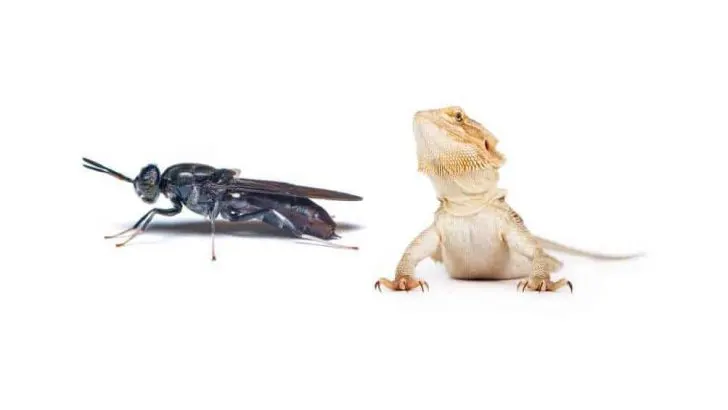All bearded dragons have a significant risk of developing metabolic bone disease. Many owners deeply fear for their beardies, asking me constantly, “Can bearded dragons eat black soldier flies?” Can these insects help them in any way?
I’m always sad when my clients rush to me with these concerns. Fortunately for them, and all of you have this unease:
Bearded dragons CAN eat black soldier flies, and it will aid them against developing MBD!
How can you even correctly feed beardies with black soldier flies? Aren’t these insects too quick for them to catch them efficiently? What can you do to help out your bearded dragon with catching black soldier flies?
In the wilderness, bearded dragons have a tough time surviving through the hard weather conditions. They need to go and search for some prey that can fill them up appropriately with specific nutrients. Stay around and find out why are black soldier flies the perfect choice for bearded dragons!
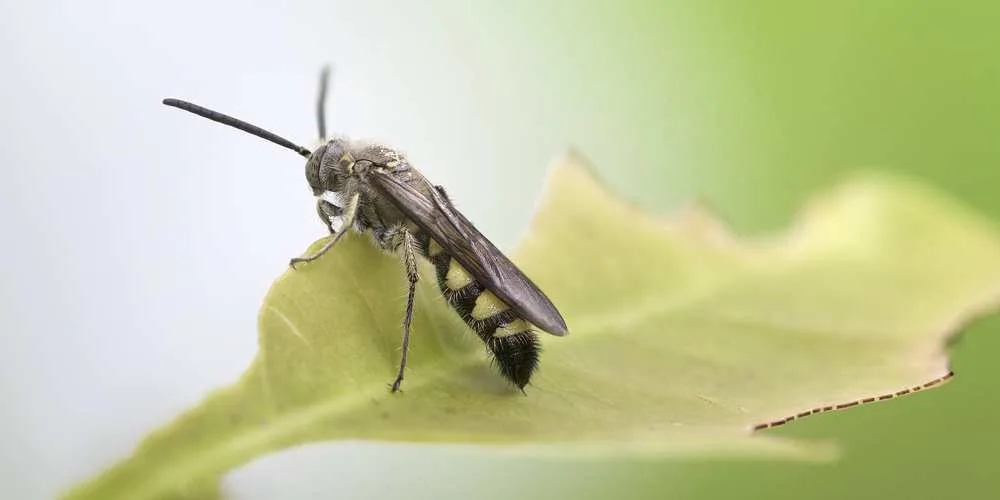
Can Bearded Dragons Find Black Soldier Flies In The Wild?
Bearded dragons aren’t your classic pets – they first needed to be domesticated from their wild habitat. Not that long ago, in the 1990s, beardies were introduced to the United States as pets. Since then, many consider them to be the best exotic pet in the world!
And why wouldn’t they – with beardies’ triangular heads, flattened bodies, and spiny scales that make them look like real dragons! Australia, bearded dragons’ central habit location, banned the sale of its wildlife as pets in the 1960s.
In some states, it’s illegal to buy, sell or own a bearded dragon, but you will be safe to buy one if you live in a state that didn’t ban their trafficking. Do some research before you decide to get one for yourself, as violating this law can lead to a sentence in jail!
Bearded dragons populate various areas in Australia, such as scrublands, savannas, deserts, woodlands, and shore areas. You’ve probably guessed it right – in most of these areas; temperatures will rise above the ordinary. Some places go as high as 100 degrees Fahrenheit!
In sommer conditions, beardies have a rough time traversing the lands. Instead, when it’s just too hot for them to travel, they tend to burrow underground. Forming these tunnels comes in handy when they need to protect themselves from the climate changes at night and predation.
Scavenging isn’t too complicated for bearded dragons most of the time (when discussing various fruits and vegetables). As they are on a constant move, they need to eat every time they stumble upon some food – veggies and fruits are perfect for them as they are stationary.
But what happens when a meal isn’t motionless? How do bearded dragons fare when they need to hunt other animals for food? It can be difficult at times, but they are relatively successful hunters – and they need to be to survive in those extreme weather conditions!
Beardies’ diet consists mainly of insects and small animals, averaging up to 75% of their food regime; the other 25% are various greens. You get the point – bearded dragons must know how to hunt insects and other animals as their diet is mainly made of them.
So, can bearded dragons find black soldier flies? Unlike beardies, black soldier flies live in a variety of different locations. Most of them are in the United States, but some can be found in France, Italy, Malta, Switzerland, Russia, and Croatia.
Fortunately for wild bearded dragons, black soldier ants can be located in the Australasian realm as well. They are easy to spot – a medium-sized insect with a black body, metallic reflections ranging from green to blue on the thorax.
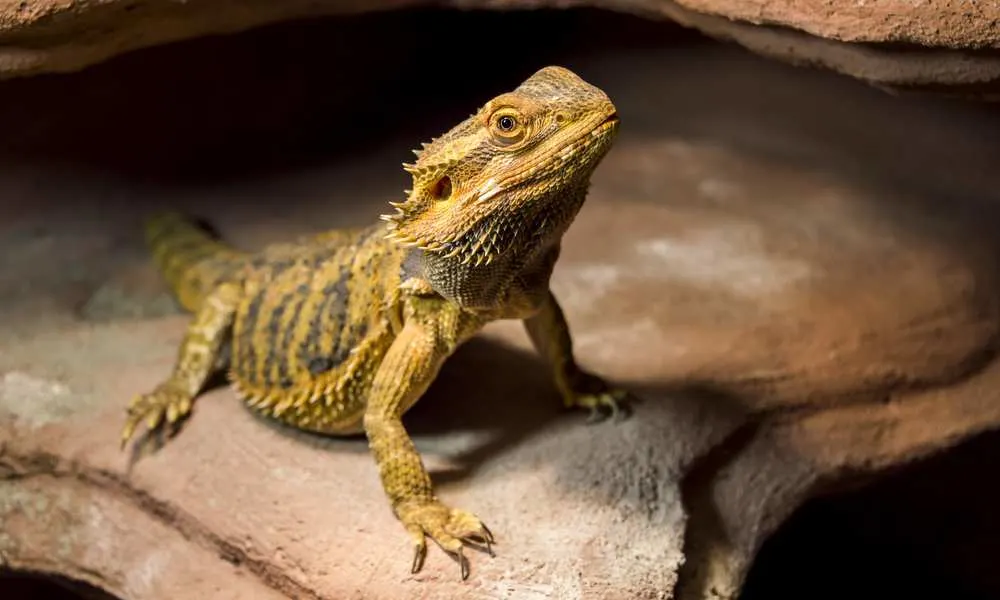
How Do Bearded Dragons Hunt Black Soldier Flies?
An adult black soldier flies female can lay a couple of hundred eggs at a time. Before laying the eggs, it needs to find a good spot to deposit them. In most cases, surfaces above or adjacent to decaying matter like compost is the safest spot for laying the eggs.
Eggs hatch in about four days and become larvae that feast on nearby organic matter, no matter what they are. The more nourishment larvae get from those organic matters, the faster they will leave their larval stage, which regularly lasts from 18 to 36 days.
Next is the pupal stage which lasts from one to two weeks. Lastly, when black soldier flies enter adulthood, they typically live 47 to 73 days, as long as they can eat properly. In the wild, they mainly stuck on nectar found in various plants.
As black soldiers flies traverse the landscape, searching for food and water, they are in a constant state of risk. Most animals regard them as a great source of healthy nourishment, and wild bearded dragons are amongst those animals.
It’s a complex process for bearded dragons to hunt black soldier flies, but it’s worth every penny when they catch some.
A typical hunting scenario looks like this:
- If the weather conditions are optimal (not too hot and not too cold), bearded dragons will unburrow from the ground. Before they start to walk in a specific direction, they will carefully plan which direction is the safest to travel.
- The sun can heat the ground rather quickly when the surface is directly exposed to the sunlight. There is no time to waste – beardies must be on a constant move to ensure that they don’t get their feet burnt up.
- An ideal spot for hunting is a place that has a natural cover from the sun – typically found below tall trees. Bearded dragons will tend to stay there most of the time until the night comes. The same can be said for other animals.
- Beardies will eat all the fresh veggies and fruits they stumble upon but will constantly be alerted if something starts approaching them. Giant lizards, dingoes, and birds will prey on bearded dragons if they find some.
- Luckily for beardies, they will spot them on time, and well, most of the time, successfully escape. On the other hand, if any insects try to fly too close to them, bearded dragons won’t hesitate to catch some.
- Especially black soldier flies – they are a delicacy for beardies! Those flies are fast, but bearded dragons can catch black soldier flies with some luck and good reflexes.
- Whenever bearded dragons catch a black soldier fly, they will use their strong jaws to crush the insect entirely. By slowly dissecting them into small pieces, beardies will eat them as a whole when they become small enough.
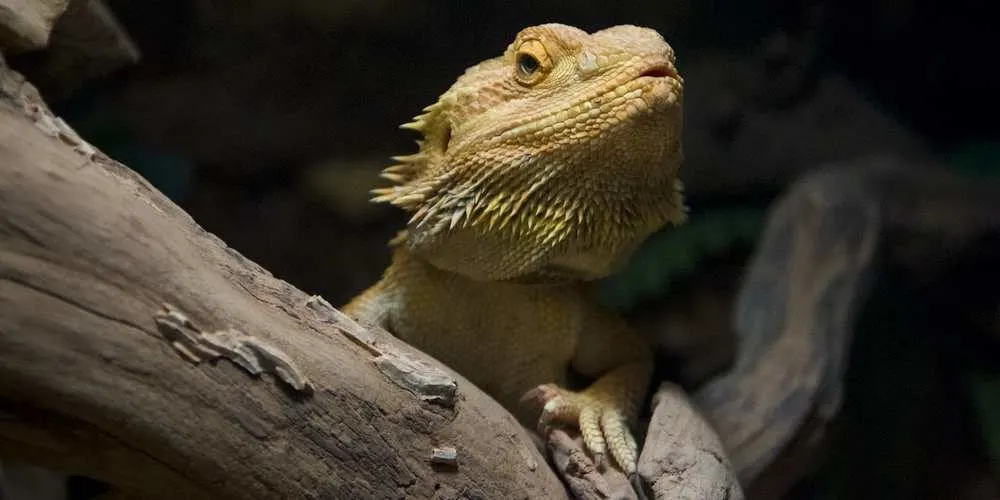
Health Benefits Of Eating Black Soldier Flies
All bearded dragons, whether they are in the wild or captivity, can potentially suffer from metabolic bone disease. As I’ve mentioned before, beardies need to be on a constant move and to ensure that that happens, they need to have a diet containing high calcium levels.
Most of the fruits and vegetables that we offer them won’t have high calcium levels present, so it’s up to the other part. That one being, of course, insects and other small animals!
The metabolic bone disease represents a weakening of the skeletal structure and possible deformation. Most bearded dragons tend to acquire this disease at some point in their lives and to make sure that the risk is as low as possible, let me give you a suggestion.
When your bearded dragons come of age, start to feed them on black soldier flies as they have a high calcium concentration inside them. Contact your local veterinarian and ask him where you can buy these wonderful insects for your beardie!
Remember to feed bearded dragons properly, as these insects will fly away from them if they feel threatened.
Here’s a quick tip on how I managed to do so:
Put your bearded dragon in a box that isn’t particularly tall; the length between your beardies’ head and the top should be around four inches. One by one, add a black soldier fly to the box and close the top of the box after adding one. Don’t add the next one until your beardie eats the previous one!
| Take a stopwatch and time 15 minutes. When it starts ticking, start adding black soldier flies to the box. When the time passes, stop providing your bearded dragons with these insects. Don’t do this every day; it’s safe to feed them like this once per week. |
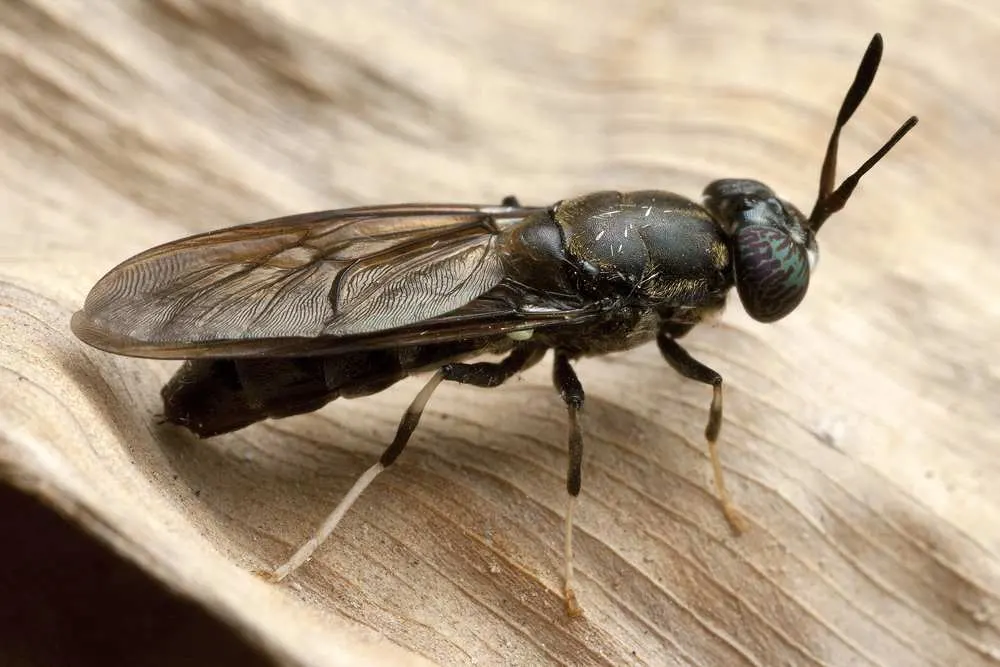
Final Thoughts
In search of a perfect source of calcium for beardies, people ask can bearded dragons eat black soldier flies. Many other insects can satisfy the demands of bearded dragons’ calcium intake, but many can’t provide as much calcium to beardies as black soldiers flies can!
Wild bearded dragons don’t have the luxury of eating black soldier flies whenever they can, like domesticated beardies. They need to go on long hunting sessions, putting their lives on the line every day. Luckily for bearded dragons, they are pretty agile creatures and can escape dire situations efficiently.
Beardies won’t hesitate to catch a black soldier fly if it flies too close to them. It may be tricky to catch them, but bearded dragons can accomplish that with good reflexes!
Black soldier flies make an excellent solution for preventing metabolic bone disease in bearded dragons as these insects are rich in calcium.
Don’t be shy and offer beardies some black soldier flies – they will be thankful to you for the rest of their lives!

